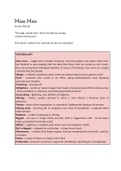Summary
Summary Poem Analysis of 'Mass Man' by Derek Walcott
Here’s a detailed analysis of Derek Walcott’s poem ‘Mass Man; it’s tailored towards students taking the CIE / Cambridge A-Level syllabus but will be useful for anyone who’s working on understanding the poem at any level. Great for revision, missed lessons, boosting analytical / research ...
[Show more]




